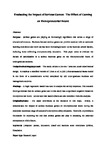Evaluating the impact of serious games: the effect of gaming on entrepreneurial intent
| dc.contributor.author | Newbery, R | |
| dc.contributor.author | Lean, J | |
| dc.contributor.author | Moizer, J | |
| dc.date.accessioned | 2016-10-21T13:45:26Z | |
| dc.date.available | 2016-10-21T13:45:26Z | |
| dc.date.issued | 2016-11-07 | |
| dc.identifier.issn | 0959-3845 | |
| dc.identifier.issn | 1758-5813 | |
| dc.identifier.uri | http://hdl.handle.net/10026.1/6586 | |
| dc.description.abstract |
Purpose - Serious games are playing an increasingly significant role across a range of educational contexts. Business focused serious games can provide students with an authentic learning experience and their use has been increasingly taken up by business school faculty, including those delivering entrepreneurship education. This paper seeks to evaluate the impact of participation in a serious business game on the Entrepreneurial Intent of undergraduate students. Design/methodology/approach - The study adopts a pre-test / post-test quasi-experimental design. It employs a modified version of Linan et al.’s (2011) Entrepreneurial Intent model in the form of a questionnaire survey completed by 263 undergraduate business and management students. Findings – A logic regression model was used to analyse the survey responses. The research findings indicate that the serious game used in this study has a significant negative impact on Entrepreneurial Intent. Gender and role model effects are also identified from the analysis. Originality/value - The paper contributes to the literature in two ways. Firstly, it demonstrates the impact of serious business games on Entrepreneurial Intent during the enterprise awareness stage of a student’s entrepreneurship education. Secondly, it provides a foundation for exploring the role that serious games can play in educating the potential entrepreneurs of the future. | |
| dc.format.extent | 733-749 | |
| dc.language | en | |
| dc.language.iso | en | |
| dc.publisher | Emerald | |
| dc.subject | Computer Games | |
| dc.subject | Education | |
| dc.subject | Small and medium sized enterprises (SMEs) | |
| dc.subject | Simulation | |
| dc.title | Evaluating the impact of serious games: the effect of gaming on entrepreneurial intent | |
| dc.type | journal-article | |
| dc.type | Article | |
| plymouth.author-url | https://www.webofscience.com/api/gateway?GWVersion=2&SrcApp=PARTNER_APP&SrcAuth=LinksAMR&KeyUT=WOS:000390712900004&DestLinkType=FullRecord&DestApp=ALL_WOS&UsrCustomerID=11bb513d99f797142bcfeffcc58ea008 | |
| plymouth.issue | 4 | |
| plymouth.volume | 29 | |
| plymouth.publication-status | Published | |
| plymouth.journal | Information Technology and People | |
| dc.identifier.doi | 10.1108/ITP-05-2015-0111 | |
| plymouth.organisational-group | /Plymouth | |
| plymouth.organisational-group | /Plymouth/Faculty of Arts, Humanities and Business | |
| plymouth.organisational-group | /Plymouth/Faculty of Arts, Humanities and Business/Plymouth Business School | |
| plymouth.organisational-group | /Plymouth/REF 2021 Researchers by UoA | |
| plymouth.organisational-group | /Plymouth/REF 2021 Researchers by UoA/UoA17 Business and Management Studies | |
| plymouth.organisational-group | /Plymouth/Users by role | |
| plymouth.organisational-group | /Plymouth/Users by role/Academics | |
| dcterms.dateAccepted | 2015-08-19 | |
| dc.identifier.eissn | 1758-5813 | |
| dc.rights.embargoperiod | Not known | |
| rioxxterms.versionofrecord | 10.1108/ITP-05-2015-0111 | |
| rioxxterms.licenseref.uri | http://www.rioxx.net/licenses/all-rights-reserved | |
| rioxxterms.licenseref.startdate | 2016-11-07 | |
| rioxxterms.type | Journal Article/Review |


